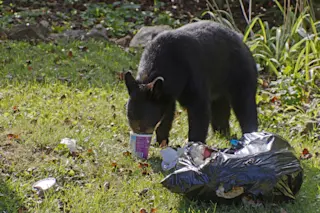Bears with diets that are based largely on human food are hibernating less, which is causing them to age quicker biologically, according to a new study published in NatureScientific Reports.
A research team tracked 30 black bears near Durango, Colo., between 2011 and 2015, paying close attention to their eating and hibernation habits. The researchers found that bears who foraged on human food hibernated less during the winters — sometimes, by as much as 50 days — than bears who ate a natural diet.
The researchers aren’t sure why human food is causing bears to spend less time in their dens. But they say shorter hibernation periods are accelerating bears’ rates of cellular aging. Using blood and hair sampling, the researchers found bears with briefer hibernations had shorter telomeres, the protective caps on chromosomes that wear away over time.
“Telomeres can be affected by individual characteristics — like the age ...














